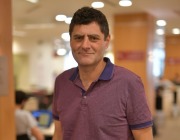Summary of my Activities and Future Plans
My research deals with the interpretative study of Jewish folk literature (mostly medieval and early modern works but also modern and contemporary oral narratives, and folk narratives transmitted by digital media), using theoretical tools that are rarely applied in these contexts, but also creating new theoretical frames. My interpretations take both cultural and historical background into consideration and use comparative readings of literary traditions found in the medieval and early modern “Latin West”, and in contemporary Israel to better understand the meanings of these stories for their narrating societies.
For instance, in my Ph.D. dissertation (Rotman, 2012) and the book based on it (Rotman, 2016), my study of Ashkenazi folk narratives of the high middle ages is part of broader attempt to present an efficient, cross temporal and cross cultural characterization of the concept of the marvelous (i.e. – monsters, demons, magical realms , etc.) that makes it possible to understand its functions in various contexts. In addition to an in-depth textual examination of the folk narrative in community life, I applied psychoanalytic methodologies and those developed in gender studies.
In other works, I have applied literary theories to characterize broader theoretical features of these texts. When examining the literary genre of the “Family Narrative” and trying to characterize it, I used personal narratives collected in fieldwork on secularization processes (Rotman, 2007). I have implemented diachronic and synchronic analyses of narratives to develop methodological tools to study the influence of the editors on the meanings, messages and functions of the stories included in anthologies (Rotman, 2006) and also to examine the role of preachers as performers and storytellers (Rotman, 2014). I was also working on a research project that involves mapping and characterizing the early modern Jewish narrative which some of its findings were pulished in two articles in the last two years (Rotman 2018; Rotman 2019).
Different point of view lead Prof. Eli Yassif and me in a co-researche project funded by the Israel Science Foundation (ISF), that deals with mapping the narrative materials found in the Cairo Genizah. This vast amount of medieval and early modern material had never been studied systematically before. In our work we discovered "new" materials (three hundred to eight hundred years old…) that have enriched the picture of a millennium of Jewish prose narrative in its various languages, an area where much more is known about European than West African or Middle Eastern works.
In other projects, I was collaborating with experts in other fields in an attempt to examine sources I am familiar with from mine, but from different points of view.
In cooperation with Dr. Yael Sela Teichler from the Open University of Israel, I examined the development of the Jewish myth of “The Loss of Music”. This is a perception that is reflected in a series of Midrashim and exegeses about Psalm 137, which were told in Ashkenazi and Sephardi communities from the end of 11th century onward. These texts, which are part of a dialogue and polemic with Christian perceptions, considers the destruction of the temple and the beginning of exile as the exact point in time when the people of Israel lost its unique musical ability, which was a central medium of communication between the people and its god. This myth had several transformations from its first appearances during the middle ages to early Zionism. We presented some of our findings in a seminar at the Katz Center for Advanced Jewish Studies in Philadelphia 2014, and at the Renaissance Society of America Annual Meeting, in Berlin 2015.We hope to submit an article based on this project.
In cooperation with Dr. Uriah Kfir from Ben Gurion University of the Negev, entitled “the Hebrew Poet from Spain as a Literary Hero”, and is funded by the ISF we are examining the ways in which the classical Hebrew poets from medieval Al-Andalous image as cultural heroes was shaped in Jewish thought and Hebrew literature over the generations. Our research is interdisciplinary in character and combines two main disciplines—the study of medieval Hebrew poetry and the study of Hebrew folklore, literature, and culture. We believe that this somewhat unusual combination can make an important contribution to both fields. Some findings of this project were presented in some conferences and were included in an article submitted to the German Fabula : Journal of Folktale Studies” and is currently under review, a second article and a scientific anthology are in progress.
The latest research project I begun this year is dealing with the contemporary Jewish cult of Rachel the Matriarch. The corpus I am examining in this project includes oral narratives and dozens of narratives transmitted in digital media, mostly on the internet around revelation of the biblical saint in Israel of the last three decades (from the Oslo accord onward) and about the complex system of links between folklore, politics and gender. First findings of this project were presented in tha last Annual Conference of Folklore Studies in Israel, and I’m currently writing an article I intend to submit in a few weeks to an English-language Journal of folklore studies.

